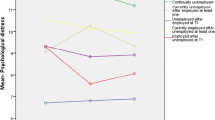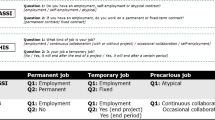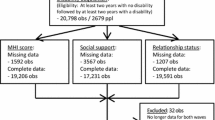Abstract
Although it has been established that unemployment and underemployment increase distress and depression, the psychological mechanisms involved are not very clear. This study examines the roles of social support and coping strategies as mediators of the association between employment status and mental health, as well as gender and age differences as moderators. Residents from the epidemiological catchment area of south-west Montreal responded to a randomized household survey for adults in 2009. A follow-up was conducted based on participants’ employment status 2 and 4 years later. ANOVAs tests were computed with SPSS to evaluate group differences, and structural equation modeling was performed with AMOS to test mediation effects. At baseline, among participants between 18 and 64 years old (n = 2325), 14.3 % were unemployed/not studying, 14.4 % worked part-time, and 56.5 % worked full-time. Employment status was found to significantly affect depression among those under 45 years old (chi-square = 23.4, p < 0.001). Results showed a negative association of full-time employment with depression, which was fully mediated by social support, less coping with drugs/medication, and less distress. A negative association with full-time employment was also noted with distress, which was partially mediated by increased social support, coping with alcohol, and less coping with drugs/medication. The total indirect effect suggests that full-time employees generally have more resources and do not tend to use avoidance strategies like coping with drugs/medication, resulting in less distress (β = −0.05; p < 0.01) and depression (β = −0.028; p < 0.01). Results suggest that optimal impact on mental health could be attained when increasing employment, namely full-time employment, in communities.


Similar content being viewed by others
References
Butterworth P, Leach LS, Pirkis J, Kelaher M: Poor mental health influences risk and duration of unemployment: a prospective study. Social Psychiatry and Psychiatric Epidemiology 47(6):1013–1021, 2012.
Gouvernement du Québec: Emploi-Québec. Plan d’action 2012–2013. In: Emploi-Québec (Ed) Québec, 2012.
Dooley D: Unemployment, underemployment, and mental health: conceptualizing employment status as a continuum. American Journal of Community Psychology 32:9–20, 2003.
Dooley D, Prause J, Ham-Rowbottom KA: Underemployment and depression: longitudinal relationships. Journal of Health and Social Behavior 41(4):421–436, 2000.
Kasl SV, Jones BA: Unemployment and health. In: Ayers S, Baum A, McManus C, Newman S, Wallston K, Weinman J (Eds) Cambridge handbook of psychology, health and medicine, Cambridge, Cambridge University Press, 2007.
Rosenthal L, Carroll-Scott A, Earnshaw VA, Santilli A, Ickovics JR: The importance of full-time work for urban adults’ mental and physical health. Social Science and Medicine 75(9):1692–1696, 2012.
Harrington EF, Crowther JH, Henrickson HC, Mickelson KD: The relationships among trauma, stress, ethnicity, and binge eating. Cultural Diversity and Ethnic Minority Psychology 12(2):212–229, 2006.
Witkiewitz K, Desai SA, Steckler G, Jackson KM, Bowen S, Leigh BC, et al.: Concurrent drinking and smoking among college students: An event-level analysis. Psychology of addictive behaviors : Journal of the Society of Psychologists in Addictive Behaviors 26(3):649–654, 2012.
Coyne JC, Downey G: Social factors and psychopathology: stress, social support, and coping processes. Annual Review of Psychology 42:401–425, 1991.
Lazarus R, Folkman S: Stress, appraisal, and coping. New York, Springer, 1984.
Taylor SE, Stanton AL: Coping resources, coping processes, and mental health. Annual Review of Clinical Psychology 3:377–401, 2007.
Zubin J, Spring B: Vulnerability–a new view of schizophrenia. Journal of Abnormal Psychology 86(2):103–126, 1977.
Cobb S: Social support as a moderator of life stress. Psychosomatic Medicine 38(5):300–314, 1976.
Park H-S: Effects of Social Support, Coping Strategies, Self-esteem, Mastery, and Religiosity on the Relationship between Stress and Depression among Korean Immigrants in the United States: Structural Equation Modeling. University of Texas, Austin, 2007.
Sherbourne CD, Hays RD, Wells KB: Personal and psychosocial risk factors for physical and mental health outcomes and course of depression among depressed patients. Journal of Consulting and Clinical Psychology 63(3):345–355, 1995.
Thoits PA: Stress, coping, and social support processes: where are we? What next? Journal of Health and Social Behavior 1:53–79, 1995.
Caron J, Guay S: Soutien social et santé mentale: concept, mesures, recherches récentes et implications pour les cliniciens. Santé mentale au Québec 30(2):15–41, 2005.
Cohen S, Underwwod LG, Gottlieb BH: Social relationships and health. In: Cohen S, Underwwod LG, Gottlieb BH (Eds): Social Support Measurement and Intervention. New York, Oxford University Press, pp. 3–25, 2000.
Bambra C: Yesterday once more? Unemployment and health in the 21st century. Journal of Epidemiology and Community Health 64(3):213–215, 2010.
Bartley M: Unemployment and ill health: understanding the relationship. Journal of Epidemiology and Community Health 48(4):333–337, 1994.
Folkman S, Lazarus RS: Stress processes and depressive symptomatology. Journal of Abnormal Psychology 95(2):107–113, 1986.
Mattlin JA, Wethington E, Kessler RC: Situational determinants of coping and coping effectiveness. Journal of Health and Social Behavior 31(1):103–122, 1990.
Holahan CJ, Moos RH, Holahan CK, Brennan PL: Social context, coping strategies, and depressive symptoms: an expanded model with cardiac patients. Journal of Personality and Social Psychology 72(4):918–928, 1997.
Thoits PA: Stress and health: major findings and policy implications. Journal of health and social behavior 51 Suppl 1:S41–S53, 2010.
Moos RH, Swindle RW: Stressful life circumstances: Concepts and measures. Stress Medicine 6(3):171–178, 1990.
Statistics Canada. National Population Health Survey (NPHS), Cycle 1–9: 2003–2005 Household Component—Longitudinal [Canada] [Microdata]. In: Division HS, (Ed) Ottawa, Statistics Canada, 2012.
Morton LM, Cahill J, Hartge P: Reporting participation in epidemiologic studies: a survey of practice. American Journal of Epidemiology 163(3):197–203, 2006.
Kessler R, Barker P, Colpe L, Epstein J, Gfroerer J, Hiripi E, et al.: Screening for serious mental illness in the general population. Archives of General Psychiatry 60(2):184–189, 2003.
Kessler R, Andrews G, Mroczek D, Ustun B, Wittchen HU: The World Health Organisation Composite International Diagnostic Interview short-form (CIDISF). International Journal of Methods in Psychiatric Research 7(4):171–185, 1998.
Laurin I: Facteurs de risque de la condition de sans domicile fixe. Comparaison d’une cohorte de nouveau sans domicile fixe et d’une cohorte de domiciliés pauvres. Montréal, Université de Montréal, 1998.
Statistics Canada. Canadian Community Health Survey (CCHS): Mental Health and Wellbeing, 2002: Cycle 1.2 Ottawa, Ontario: 2002 Contract No.: September 1, 2011.
Cutrona CE, Russell DW: The provisions of social support and adaptation to stress. In: Jones WH, Perlman D (Eds) Advance in Personal Relationships, Vol. 1, Greenwich, JAI Press, pp. 37–67, 1987.
Caron J: L’Échelle de provisions sociales: une validation québécoise Santé mentale au Québec 21(2):158–180, 1996.
Hooper D, Coughlan J, Mullen MR: Structural equation modelling: Guidelines for determining model fit. Electronic Journal of Business Research Methods 6(1):53–60, 2008.
Baron RM, Kenny DA: The moderator-mediator variable distinction in social psychological research: conceptual, strategic, and statistical considerations. Journal of Personality and Social Psychology 51(6):1173–1182, 1986.
Preacher KJ, Hayes AF: Asymptotic and resampling strategies for assessing and comparing indirect effects in multiple mediator models. Behavior Research Methods 40(3):879–891, 2008.
Kline R: Principles and practice of structural equation modeling. New York, Guilford Press, 2011.
Turbide B, Joseph G: Portrait sociodémographique, socioéconomique et scolaire de la région de Montréal 2006 [cited 2011 September 12]. Available from: http://www.centre123go.ca/upload/documents/62A2B479-2DA8-0507-B71E−33334FA113D1-portrait_montreal_QEF.pdf.
Chen L, Li W, He J, Wu L, Yan Z, Tang W: Mental health, duration of unemployment, and coping strategy: a cross-sectional study of unemployed migrant workers in eastern China during the economic crisis. BMC Public Health 12:597, 2012.
Liwowsky I, Kramer D, Mergl R, Bramesfeld A, Allgaier AK, Poppel E, et al.: Screening for depression in the older long-term unemployed. Social Psychiatry and Psychiatric Epidemiology 44(8):622–627, 2009.
Moore S, Sikora P, Grunberg L, Greenberg E: Work stress and alcohol use: Examining the tension-reduction model as a function of worker’s parent’s alcohol use. Addictive Behaviors 32(12):3114–3121, 2007.
Nanhou V, Audet N: Les comportements à risque pour la santé liés au tabac, à l’alcool, aux drogues et aux jeux de hasard et d’argent. Qui les adopte? Qui les combine? Institut de la statistique du Québec, 2012.
Sargent-Cox K, Butterworth P, Anstey KJ: The global financial crisis and psychological health in a sample of Australian older adults: a longitudinal study. Social Science Medicine 73(7):1105–1112, 2011.
Fennell MJ: Depression, low self-esteem and mindfulness. Behavior Research and Therapy 42(9):1053–1067, 2004.
Penninx BW, van Tilburg T, Deeg DJ, Kriegsman DM, Boeke AJ, van Eijk JT: Direct and buffer effects of social support and personal coping resources in individuals with arthritis. Social Science and Medicine 44(3):393–402, 1997.
Mantler J, Matejicek A, Matheson K, Anisman H: Coping with employment uncertainty: a comparison of employed and unemployed workers. Journal of Occupational Health Psychology 10(3):200–209, 2005.
Koopman C, Wanat SF, Whitsell S, Westrup D, Matano RA. Relationships of alcohol use, stress, avoidance coping, and other factors with mental health in a highly educated workforce. American Journal of Health Promotion 17(4):259–268, 2003.
Jusot F, Khlat M, Rochereau T, Serme C: Job loss from poor health, smoking and obesity: a national prospective survey in France. Journal of Epidemiology and Community Health 62(4):332–327, 2008.
Acknowledgments
The authors would like to thank all of the participants who took part in the study. Thank you to Diana Milton for her help in the linguistic revision of the article. The work presented in this study was conducted at the Douglas Mental Health University Institute. This manuscript is original, not previously published, and not under concurrent consideration elsewhere. Funding was provided by the Canadian Institutes of Health Research (CIHR).
Funding Information
This study was funded by the Canadian Institutes of Health Research, Grant No. 245417, received by Jean Caron, Ph.D.
Author information
Authors and Affiliations
Corresponding author
Ethics declarations
Conflict of interest
Michel Perreault, Ph.D. declares that he has no conflict of interest, El Hadj Touré, Ph.D. declares that he has no conflict of interest, Nicole Perreault, Ph.D. declares that she has no conflict of interest; Jean Caron, Ph.D. declares that he has no conflict of interest.
Ethical approval
All procedures performed in studies involving human participants were in accordance with the ethical standards of the institutional and/or national research committee and with the 1964 Helsinki declaration and its later amendments or comparable ethical standards. This article does not contain any studies with animals performed by any of the authors.
Informed consent
Informed consent was obtained from all individual participants included in the study.
Rights and permissions
About this article
Cite this article
Perreault, M., Touré, E.H., Perreault, N. et al. Employment Status and Mental Health: Mediating Roles of Social Support and Coping Strategies. Psychiatr Q 88, 501–514 (2017). https://doi.org/10.1007/s11126-016-9460-0
Published:
Issue Date:
DOI: https://doi.org/10.1007/s11126-016-9460-0




